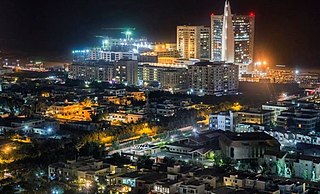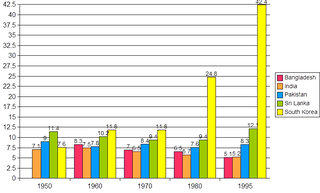
The economy of Pakistan is categorized as a developing economy. It ranks as the 24th-largest based on GDP using purchasing power parity (PPP) and the 46th largest in terms of nominal GDP. With a population of 232 million people as of 2023, Pakistan’s position at per capita income ranks 161st by GDP (nominal) and 138th by GDP (PPP) according to the International Monetary Fund (IMF).

The economy of the Republic of the Congo is a mixture of subsistence hunting and agriculture, an industrial sector based largely on petroleum extraction and support services. Government spending is characterized by budget problems and overstaffing. Petroleum has supplanted forestry as the mainstay of the economy, providing a major share of government revenues and exports. Nowadays the Republic of the Congo is increasingly converting natural gas to electricity rather than burning it, greatly improving energy prospects.

Deregulation is the process of removing or reducing state regulations, typically in the economic sphere. It is the repeal of governmental regulation of the economy. It became common in advanced industrial economies in the 1970s and 1980s, as a result of new trends in economic thinking about the inefficiencies of government regulation, and the risk that regulatory agencies would be controlled by the regulated industry to its benefit, and thereby hurt consumers and the wider economy. Economic regulations were promoted during the Gilded Age, in which progressive reforms were claimed as necessary to limit externalities like corporate abuse, unsafe child labor, monopolization, pollution, and to mitigate boom and bust cycles. Around the late 1970s, such reforms were deemed burdensome on economic growth and many politicians espousing neoliberalism started promoting deregulation.
The New Zealand electricity market (NZEM) is a decentralised electricity market regulated by the Electricity Industry Participation Code administered by the Electricity Authority (EA). The authority was established in November 2010 to replace the Electricity Commission.
The National Electricity Market (NEM) is an arrangement in Australia's electricity sector for the connection of the electricity transmission grids of the eastern and southern Australia states and territories to create a cross-state wholesale electricity market. The Australian Energy Market Commission develops and maintains the Australian National Electricity Rules (NER), which have the force of law in the states and territories participating in NEM. The Rules are enforced by the Australian Energy Regulator. The day-to-day management of NEM is performed by the Australian Energy Market Operator.
Microeconomic reform comprises policies directed to achieve improvements in economic efficiency, either by eliminating or reducing distortions in individual sectors of the economy or by reforming economy-wide policies such as tax policy and competition policy with an emphasis on economic efficiency, rather than other goals such as equity or employment growth.

The economic history of Australia traces the economic history of Australia since European settlement in 1788.

The Electricity Act, 2003 is an Act of the Parliament of India enacted to transform the power sector in India.

The State Electricity Commission of Victoria is a government-owned renewable electricity investment enterprise in Victoria, Australia. Originally a major energy supplier in the state, the SEC was privatised in the 1990s before being revived in 2023 to invest in renewable energy and storage.
The Essential Services Commission (ESC) is the economic regulator established by the State Government of Victoria, Australia to regulate prescribed essential utility services supplied by the Victorian electricity, gas, water, ports and rail freight industries and advise or report on aspects of the transport and statutory insurance sectors. In 2009, the Commission assumed the administration of the Victorian Energy Efficiency Target scheme.
The economic history of China describes the changes and developments in China's economy from the founding of the People's Republic of China (PRC) in 1949 to the present day. The speed of China's transformation in this period from one of the poorest countries to one of the world's largest economies is unmatched in history.

The Tanzania Electric Supply Company Limited (TANESCO) is a Tanzanian parastatal organisation established in 1964. It is wholly owned by the government of Tanzania. The Ministry of Energy and Minerals regulates the operations of TANESCO.
Maurice John Belgrave was a senior public servant and Chief Ombudsman of New Zealand.

Alan Robert Stockdale is the former President of the Liberal Party of Australia and a former Victorian state Deputy Liberal leader. He was Treasurer of Victoria in the government of Jeff Kennett from 1992 to 1999.

The Newport Power Station was a complex of power stations located on the west bank of the Yarra River, approximately 6 km south-west of Melbourne, Victoria, Australia, in the suburb of Newport. Newport A, B, and C were coal-fired plants which operated at the site between 1919 and the 1980s, and were claimed to be the largest power station in the southern hemisphere in 1953 with 42 boilers and 14 turbo-alternators producing 327 megawatts (439,000 hp).
As required by the Constitution, the electricity sector is federally owned, with the Federal Electricity Commission essentially controlling the whole sector; private participation and foreign companies are allowed to operate in the country only through specific service contracts. Attempts to reform the sector have traditionally faced strong political and social resistance in Mexico, where subsidies for residential consumers absorb substantial fiscal resources.

Nicaragua is the country in Central America with the lowest electricity generation, as well as the lowest percentage of population with access to electricity. The unbundling and privatization process of the 1990s did not achieve the expected objectives, resulting in very little generation capacity added to the system. This, together with its high dependence on oil for electricity generation, led to an energy crisis in 2006 from which the country has not fully recovered yet.

The power sector in the Dominican Republic has traditionally been, and still is, a bottleneck to the country's economic growth. A prolonged electricity crisis and ineffective remedial measures have led to a vicious cycle of regular blackouts, high operating costs of the distribution companies, large losses including electricity theft through illegal connections, high retail tariffs to cover these inefficiencies, low bill collection rates, a significant fiscal burden for the government through direct and indirect subsidies, and very high costs for consumers as many of them have to rely on expensive alternative self-generated electricity. According to the World Bank, the revitalization of the Dominican economy depends greatly on a sound reform of the sector.

The economy of Gujarat, a state in Western India, is the most industrialised in India, having the highest industrial output of any state in the union.It has the highest exports of any Indian state, accounting for 33% of all Indian exports in 2022-23. It leads in diverse industrial sectors such as chemicals, petrochemicals, dairy, drugs and pharmaceuticals, cement and ceramics, gems and jewellery, textiles and engineering. It has the highest Electricity Production Capacity and Maritime Port Cargo Volume among all states in India. It also has significant agricultural production with major agricultural produce of the state being cotton, groundnuts (peanuts), dates, sugar cane, milk and milk products. Gujarat recorded the lowest unemployment rate in India in 2022, with 4.4% of the labour force being unemployed.

The Nationalisation process in Pakistan was a policy measure programme in the economic history of Pakistan, made Pakistan's industrialization worse and lifted the trust of businessmen and investors. It first introduced, promulgated and implemented by Zulfikar Ali Bhutto and Pakistan Peoples Party to lay the foundation of socialist economics reforms to improve the growth of national economy of Pakistan. Since the 1950s, the country had undergone a speedy industrialisation. But, as time progressed, the labour trade unions and labour-working class had increasingly strained relations with the industrial business oligarch class, having neglected to improve working conditions and failing to provide a healthy and safe environment for the workers in these industrial industries.












